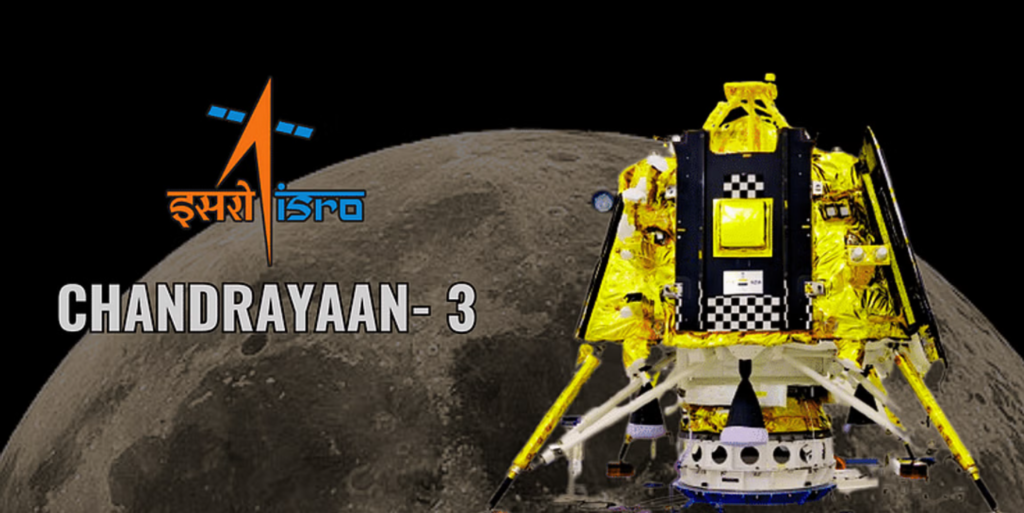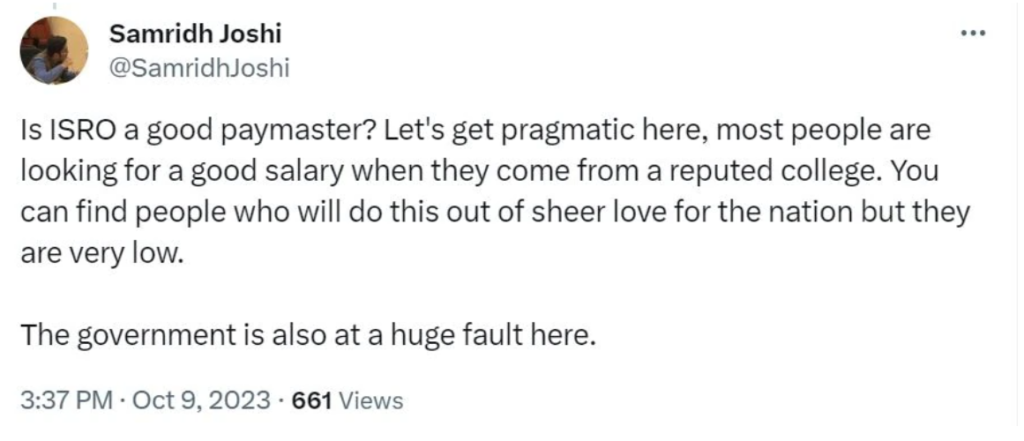ISRO Chairman explains that 60% of students left a recruiting drive after discovering the salary structure, and IITians decided against joining ISRO
The Reason of Refusing to Join ISRO by IITian :
Due to pay structures, the Indian Space Research Organization (ISRO) has struggled to attract the brightest engineers from the nation’s esteemed engineering schools, the Indian Institute of Technology (IIT) – According to Dr. S. Somanath, chairman of the space agency. He claimed that “our best talents are supposed to be engineers and they are supposed to be IITians.” But they’re not a part of ISRO. No one joins if we go and try to recruit from IIT.

Few individuals, he continued, “such individuals join,” are those who value space. “But not many, and the percentage is hardly less than 1% or even lower,” Somanath added. It was under his leadership that India made history by being the fourth nation to set foot on the Moon and the first to do so in the south pole region.
ISRO Chairman Dr. S. Somanath : The head of ISRO gave an illustration of what transpired when his team visited an IIT to hire engineers. “They were offering the job possibility to them. After discussing job types and career options, they discussed the ISRO system’s pay structure. The students seated there witnessed the greatest salary they had ever received from ISRO. There it was. 60% of the audience left after the presentation, according to Somanath.
ISRO Chairman Dr. S. Somanath Salary :

According to the head of the space agency, IITI employees likely start with the highest pay at ISRO. Business mogul Harsh Goenka stated in a tweet from last month that Somanath, who holds the top position at ISRO and also serves as secretary of the Department of Space, earns Rs 2.5 lakh per year, which is the standard placement package at the best IITs. Although the ISRO has various pay scales for various positions, the basic engineer salary is roughly Rs 56,100.

Following the achievement of Chandrayaan-3, Congressman Shashi Tharoor also brought attention to the tendency of IITians favoring fat packages. He said that many of his coworkers attended the College of Engineering, Thiruvananthapuram (CET), and that Somanath attended Kerala’s TKM College of Engineering. He added that the success of Chandrayaan-3 was contributed to by at least seven other CET engineers.
ISRO Chairman Dr. S. Somanath : Tharoor’s Tweet
“Indians are rightly obsessed with the IITs, but let’s salute the alumni of unsung engineering colleges who serve the public sector with dedication & who are the backbone of national enterprises like @ISRO,” Tharoor tweeted. “IITians went to Silicon Valley; CETians took us to the moon!”


According to Samridh Joshi
IIT Kanpur alumnus Samridh Joshi claimed that after graduating from a reputable university, most people strive for a big wage. Although they are quite low, you can find people that will do this out of pure love for the country. Another major fault here belongs to the government.

Somanath’s revelation that less than 1% of IIT graduates work for ISRO has aroused discussion, with some arguing that given how heavily subsidized IIT education is, many talented individuals ought to join the space agency. Some people, meanwhile, agreed with the students who claimed that everyone is attracted to money. Anmol Sharma stated, “I think ISRO needs to make packages appealing for the freshers of IITs.

ISRO Chairman Dr. S. Somanath : Final Word
The Indian Space Research Organization, known for its accomplishments abroad, has difficulty luring excellent candidates, notably from IITs. Despite ISRO’s great track record, the majority of IIT graduates are hesitant to join, according to ISRO Chairman Dr. S. Somnath. The pay structure, which discourages elite talent, is the main justification given. When students found out the highest wage provided by ISRO at a recruitment session at IIT, 60% of them fled, according to Dr. Somnath’s account of the occurrence. This is a common misconception among prospective employees about the pay at the space agency.
Only about 1% of people who view space as a crucial field choose to join ISRO, the Chairman noted. Despite the agency’s important work and accomplishments, a talent gap exists since most talented employees favor other career routes.

This issue is not new; concerns over ISRO’s pay structure have gathered momentum recently, particularly after billionaire Harsh Goenka revealed the relatively low income of ISRO Chairman Dr. S. Somnath, which is Rs 2.5 lakh, in a tweet. Discussions about the financial incentives provided by ISRO and how they stack up against the starting wages at the best IITs have resulted from this.
The task for ISRO is to allay these worries and portray the organization as a desirable employer for the nation’s top engineers. The key to overcoming this talent acquisition barrier and ensuring a strong staff for future space missions may lie in revisiting the wage structure and communicating the value and impact of working with ISRO effectively.
ALSO READ : ISRO FULL FORM: Unveiling the Acronym



































